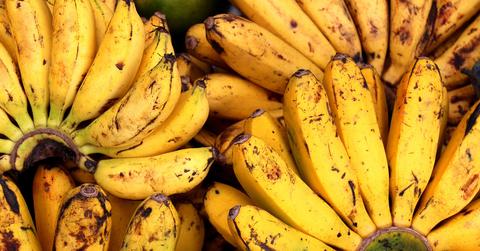UK Consumers Throw Away 1.4 Million Bananas Every Day, New Study Finds
The amount of perfectly good, edible food that gets tossed into dumpsters every day is literally bananas. A new study has found that residents in the United Kingdom toss 1.4 million bananas still ripe for eating into the trash every day.
Updated Nov. 19 2020, 9:39 p.m. ET
The amount of perfectly good, edible food that gets tossed into dumpsters every day is literally bananas. People in industrialized countries like the United States waste about as much food in a year as is produced in sub-Saharan Africa. And now, we have research that zooms in on a single fruit to show just how wasteful people are really being: the banana.
Sainsbury’s, a chain supermarket in the United Kingdom, has released a new study that finds that the country’s residents put 1.4 million bananas still ripe for eating into the trash every single day. The study, reported on by Inhabitat, was assembled by a charity called WRAP that works with governments, businesses, and communities to improve resource efficiency.
In spite of corporate chain markets, grocery stores, and even food banks taking measures to reduce food waste, those efforts don’t necessarily reach consumers. The study discovered that people are likely to put a banana in the garbage even if it is just minimally bruised, has green on the skin, or has another cosmetic blemish.
The grocery chain will install in-store “banana rescue stations” where people can pick up recipes for ripened bananas, as well as baking equipment for those dishes. This effort is part of Sainsbury’s Waste Less, Save More project. Previous work has included a pilot program to test waste-saving ideas and tech expected to save the average family in the test site $452 a year on food while cutting town waste by half.
Those of us without access to a Sainsbury’s can still do our part. Keeping bananas out of the waste stream is so simple. For starters, any food you don't want to consume should land in a compost bin—never the trash. But bananas are extra-special, since even when they're past the point of peel-and-eat, you can do tons of things with them. Here are just a few.
Make banana bread. 
When your bananas start to brown, mix them up into banana bread that is absolutely delicious. Don’t have time for bread-making today? Throw the fruits, peels and all, into the freezer until you do.
Mix up a smoothie.
Bananas add a creamy element to smoothies that pairs well with just about every other ingredient.
Harness a healthy egg replacer.
If you’ve got an egg allergy or have gone vegan, banana makes a sweet stand-in for eggs in recipes. One-quarter cup of ripened bananas works in place of one egg.
Enjoy guilt-free “ice cream.”
When you freeze banana and then add them to a blender with a plant-based milk and some vanilla protein powder (and other fresh fruit or nuts, if you like), you end up with a decadent ice cream substitute that is completely delicious, and you can feel totally OK eating all of it until it’s gone.
Whiten your teeth. 
Yup. Just take the peel and rub the inside of it against your teeth, let sit for 10 minutes, and brush your teeth to get all that banana paste off.
Eat the peels. 
You read that right—banana peels are 100 percent edible, and loaded with nutrition. The peels are packed with fiber, magnesium, manganese, potassium, and vitamins B6 and B12. Try chopping them up and adding them to smoothies, or caramelizing them for a mighty unusual treat.
